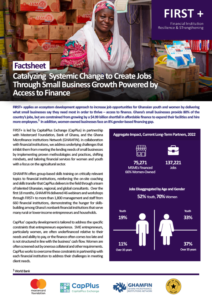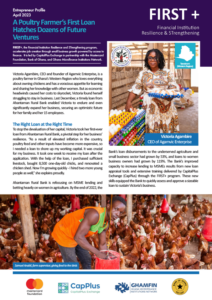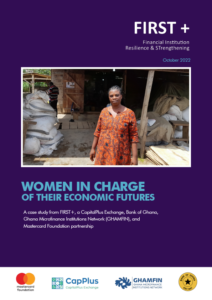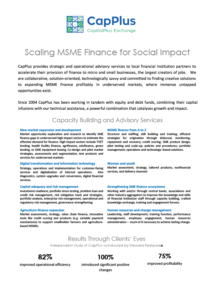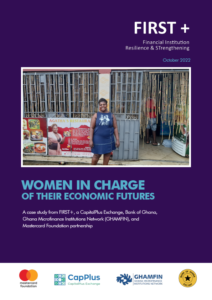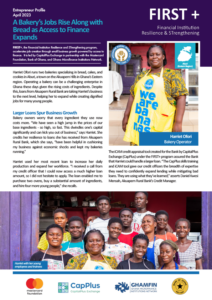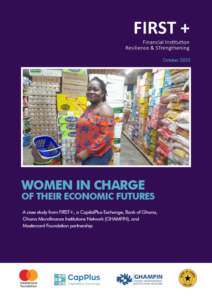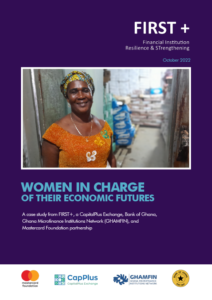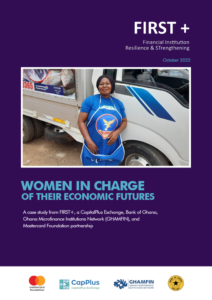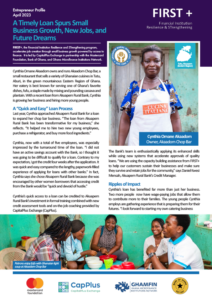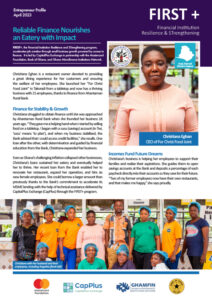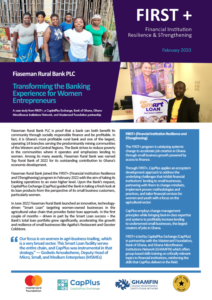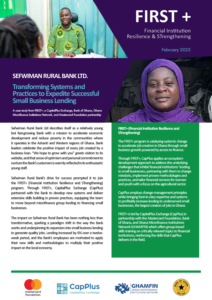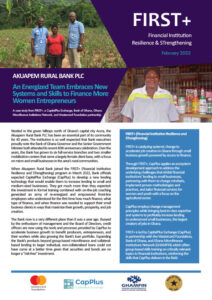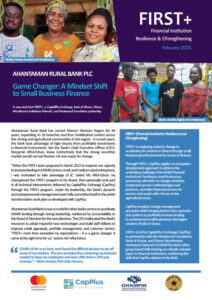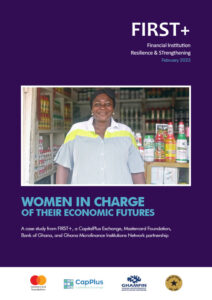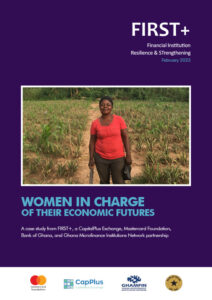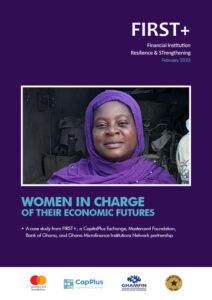
FIRST+ PROGRAM TO GENERATE WORK OPPORTUNITIES FOR 60,000 YOUNG GHANAIANS
CapPlus, Mastercard Foundation, and a consortium of partners strengthen financial institutions in Ghana to enable them to lend to MSMEs to create work opportunities for Ghanaians, especially young women and men.
Accra, Ghana – 8 December 2021 – Today, CapitalPlus Exchange (CapPlus) and the Mastercard Foundation have announced the launch of an industrywide collaboration with the Bank of Ghana and the Ghana Microfinance Institution Network (GHAMFIN). The initiative aims to strengthen financial institutions to enable them to increase lending to micro, small, and medium enterprises (MSMEs) and create work opportunities for 60,000 young Ghanaian women and men.
Dubbed Financial Institution Resilience and Strengthening (FIRST+), the program will build the capacity of players within the financial sector, including savings and loans companies, rural and small business-focused banks, microfinance, and related institutions by addressing underlying challenges that inhibit their lending to MSMEs. The program forms part of the Mastercard Foundation’s Young Africa Works strategy that aims to enable three million young people in Ghana to access dignified and fulfilling work opportunities.
In line with the Bank of Ghana’s efforts to strengthen the financial sector, financial institutions participating in the FIRST+ program will receive technical assistance to:
- expand their lending to small businesses;
- increase their attractiveness to investors, including linkages to potential sources of capital; and
- advance their digitization to improve outreach, risk management, and efficiency.
Participating financial institution staff will also benefit from expanded training and skills building provided by GHAMFIN, including Ghana’s Central Bank accredited training for directors and managers of non-bank financial institutions, to enable them to respond better to the needs of MSMEs while boosting their corporate governance structures.
“The power of combining patient capital with technical assistance has always been our preferred approach, and we are delighted to combine forces with the Mastercard Foundation, GHAMFIN, and Oikocredit to contribute to a more resilient financial sector that provides greater opportunities for Ghana’s youth and women,” said Lynn Pikholz, CapPlus’ CEO.
“We are excited to bring Oikocredit’s full suite of capital facilities to financial sector partners in the FIRST+ program. This partnership enables us to support Ghanaian youth and women while building assets and strengthening women-led businesses. With this program, we are advancing our social impact mission to support Ghana’s agricultural sector, strengthening financial institutions’ operations to provide better digital services and tailored financial products, and increasing access to capital,” said Hans Perk, Oikocredit’s Regional Africa Director.
The FIRST+ program will expand GHAMFIN’s industry building services to approximately 100 member organizations through training and one-on-one coaching for CEOs and senior managers of partner financial institutions. Interested financial sector players can participate in the program by contacting Lynn Pikholz,(lpikholz@capplus.org).
“Accelerating the growth of youth and women-led MSMEs through access to finance and capacity building will stimulate the sector and unlock work opportunities for young Ghanaian women and men especially in the agricultural value chain, fostering economic recovery and prosperity for all,” said Rosy Fynn, Ghana Country Head at the Mastercard Foundation.
-End-
About CapitalPlus Exchange
CapPlus supports sustainable solutions for economic opportunity, job creation, asset building for social enterprises and women-owned businesses and poverty alleviation. CapPlus equips financial institutions in emerging economies to deliver finance profitably for social impact. Established in 2004 in tandem with the ShoreCap equity fund, CapPlus also partners with impact investment funds to provide technical assistance alongside their capital investments in financial institutions. CapPlus programs have helped provide over $12.8 billion in 12.9 million loans to MSMEs. For more information, visit: www.capplus.org
AboutGHAMFIN
Ghana Microfinance Institutions Network (GHAMFIN) is a network of nonbank financial institution associations, microfinance associations and member financial institutions engaged in the provision of financial and non-financial services. Members include the Association of Rural Banks (ARB) / ARB Apex Bank, Ghana Association of Savings and Loans Companies (GHASALC), Ghana Association of Microfinance Companies (GAMC), Ghana Cooperative Credit Union Association (CUA), Micro Credit Association, Ghana (MCAG), Ghana Association of Financial NGOs (GHASSFIN) and Ghana Cooperative Susu Collectors Association (GCSCA). For more information visit: www.ghamfin.org
About Oikocredit
Social impact investor and worldwide cooperative Oikocredit has 45 years of experience funding organisations active in financial inclusion, agriculture, and renewable energy. Oikocredit’s loans, equity investments and capacity building aim to enable people on low incomes in Africa, Asia, and Latin America to improve their living standards sustainably. Oikocredit finances 529 partners, with total outstanding capital of € 835 million (as of 30 June 2021). For more information visit: www.oikocredit.coop
About the Mastercard Foundation
The Mastercard Foundation works with visionary organizations to enable young people in Africa and in Indigenous communities in Canada to access dignified and fulfilling work. It is one of the largest, private foundations in the world with a mission to advance learning and promote financial inclusion to create an inclusive and equitable world. The Foundation was created by Mastercard in 2006 as an independent organization with its own Board of Directors and management.
For more information on the Foundation, please visit: www.mastercardfdn.org
About Young Africa Works
Young Africa Works is the Mastercard Foundation’s strategy to enable 30 million young people, particularly young women, across Africa to access dignified and fulfilling work. Africa will be home to the world’s largest workforce with 375 million young people entering the job market by 2030. With the right skills, these young people will contribute to Africa’s global competitiveness and improve their lives and those of their communities. The Mastercard Foundation will implement Young Africa Works in 10 African countries in collaboration with governments, private sector, entrepreneurs, educators, and young people. The first phase of countries identified by the Mastercard Foundation are Rwanda, Kenya, Ghana, Senegal, Ethiopia, Ghana, and Nigeria.
Download 